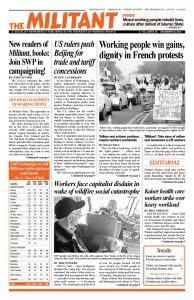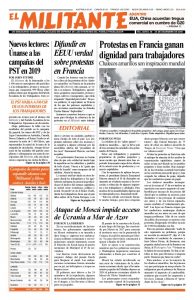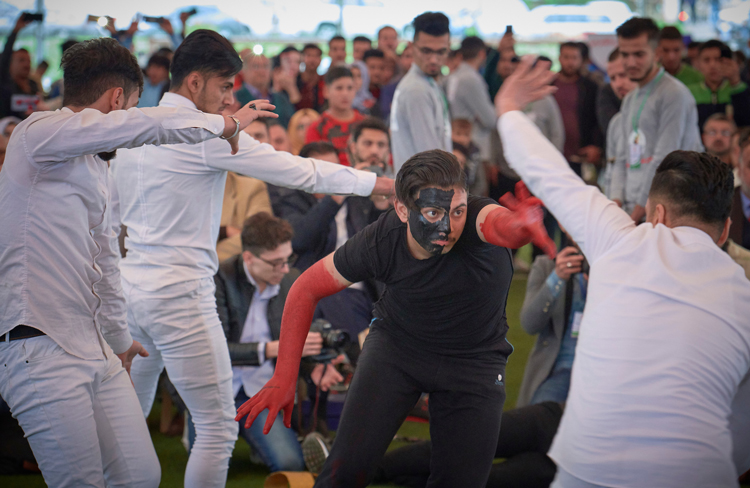MOSUL, Iraq — More than 1,000 people, including hundreds of youth, participated in the second “reading festival” here since the end of the three-year reign of terror by Islamic State. The Nov. 30 event was a celebration of the defeat of the reactionary group’s occupation and a further step forward for working people as part of an explosion of literary, artistic and other cultural activity that had been forbidden during IS’s rule.
At the festival, 30 bookshelves were lined up behind the makeshift stage, all bearing the name of a high school. In front of each were two big boxes of books.
“These are going to 30 school libraries,” Safwan Al-Madany, one of the organizers of the festival, explained. “The books for the schools are some of the 10,000 books that were donated. The rest will be sold to the public after the program.”
Nonreligious books had been banned and destroyed under IS’s rule. As part of its campaign to instil terror among working people, Islamic State suppressed any form of expression that didn’t conform to the group’s sectarian views.
It tore down statues of poets and writers and destroyed works of art and musical instruments. Its members smashed religious shrines that were important to Christians, Jews and Muslims alike. They set fire to the Mosul University library, incinerating most of its hundreds of thousands of books, to block working people gaining access to ideas. Thousands of books were rescued by students and other volunteers last year.
Islamic State’s rule was crushed in a nine-month door-to-door battle by Iraqi government and Kurdish forces backed by U.S. airstrikes that levelled swaths of Mosul.
Second ‘reading festival’
The first reading festival was held outside the burnt library in September 2017, attracting some 4,000 people.
Because of pouring rain this year’s festival was moved from the planned site outside the Mosul Museum in the western part of the city, to a sports arena just across the Tigris River where participants could still see the devastation on the other side. The museum was the last IS stronghold. It sustained the most damage during the battle for Mosul.
The festival included speeches by sponsors, poetry readings and traditional music from the area. The students and professors had come together to clear the rubble at the Faculty of Fine Arts building after the battle. A broken piano keyboard is on display there as a symbol of IS’s war against culture.
Dance depicts defeat of Islamic State
A dance performance put on by art students from the university depicted the recent history of Iraq. In the dance, a ruler becomes more and more despotic and people are driven into the ground. One gets killed and is carried away to a funeral. After the tyrant flees, figures depicting Islamic State appear, with bloodied red arms and half-black faces. They take away a painting displayed on an easel while a man playing the flute hides away his instrument.
Eventually three dancers in white clothes come onto the stage and defeat Islamic State, killing some IS combatants and driving one into the audience where he disappears.
The 1,000-strong audience stood up and cheered as the painting was put back on its easel and the musician played his flute again. Their ovation reflected the deeply held appreciation of the revival of cultural life in Mosul today.
Pathfinder Press, a publisher with offices in New York and London, made a donation of books to festival organizers. The books contain the historic lessons of 150 years of working-class struggle. Some were placed in boxes to be given to school libraries. Others were made available for purchase by festivalgoers for 1,000 Iraqi dinars each (85 cents).
Tariq Al-Qassar, director of the political science department at the University of Mosul, also received a donation of books for his department. He had been one of those who selected the books the festival donated to the schools.
In attendance at the festival and invited to join the platform was Haneen Jamal, who in March had opened Qantara, one of the cultural cafes that have been springing up in east Mosul. She told the Militant that she is the first woman to ever manage a cafe here.
The cafe recently presented the first piano recital by a woman musician in Mosul. Jamal had helped host the Iraqi National Symphony Orchestra two months ago when they performed in the city for the first time in years.
“At the beginning it was difficult, and we didn’t know if the cafe would succeed,” Jamal said, “but now women and men from across the city come to our events. There are people who hate what we do, but we must continue, because music is the food of the soul.”
The Qantara cultural cafe and the reading festival are just two among many initiatives to revive culture in the war-torn city. More book cafes have opened. Art exhibitions and concerts are being held. In September the “I am Iraqi — I read” festival, held in cities across Iraq, was organized for the first time in Mosul. The title refers to a traditional Arab saying, “Egypt writes, Lebanon publishes, and Iraq reads.” The festival was held in a park where Islamic State once trained children it had forced to become IS soldiers.


